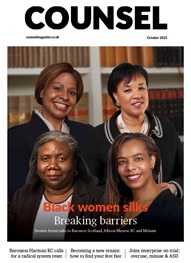*/
Lord Phillips, President of the Supreme Court, has mounted a staunch defence of the Human Rights Act 1988.
In a forthright speech at Gresham College in June, Lord Phillips said the 1998 Act was “a vital part of the foundation of our fight against terrorism”. “In my opinion, the enactment of the Human Rights Act by the previous administration was an outstanding contribution to the upholding of the rule of law in this country and one for which it deserves great credit,” he said. “Because it requires the courts to scrutinise not merely executive action but Acts of Parliament to make sure that these respect human rights, the Act has given the Supreme Court some of the functions of a Constitutional Court. Drawing the right line between protecting the rights of the individual and respecting the supremacy of Parliament is, I believe, our greatest challenge.”
However, he noted that the Act and the judges who applied it had been unfairly criticised by senior politicians and the media. Charles Clarke, when Home Secretary, claimed, “the judiciary bears not the slightest responsibility for protecting the public” Lord Phillips said: “Charles Clarke failed to appreciate that it is the duty of the judiciary to apply the laws that have been enacted by Parliament.”
In a forthright speech at Gresham College in June, Lord Phillips said the 1998 Act was “a vital part of the foundation of our fight against terrorism”. “In my opinion, the enactment of the Human Rights Act by the previous administration was an outstanding contribution to the upholding of the rule of law in this country and one for which it deserves great credit,” he said. “Because it requires the courts to scrutinise not merely executive action but Acts of Parliament to make sure that these respect human rights, the Act has given the Supreme Court some of the functions of a Constitutional Court. Drawing the right line between protecting the rights of the individual and respecting the supremacy of Parliament is, I believe, our greatest challenge.”
However, he noted that the Act and the judges who applied it had been unfairly criticised by senior politicians and the media. Charles Clarke, when Home Secretary, claimed, “the judiciary bears not the slightest responsibility for protecting the public” Lord Phillips said: “Charles Clarke failed to appreciate that it is the duty of the judiciary to apply the laws that have been enacted by Parliament.”
Lord Phillips, President of the Supreme Court, has mounted a staunch defence of the Human Rights Act 1988.


Justice system requires urgent attention and next steps on the Harman Review
Q&A with Tim Lynch of Jordan Lynch Private Finance
By Marie Law, Director of Toxicology at AlphaBiolabs
By Louise Crush of Westgate Wealth Management
Why Virtual Assistants Can Meet the Legal Profession’s Exacting Standards
Despite increased awareness, why are AI hallucinations continuing to infiltrate court cases at an alarming rate? Matthew Lee investigates
Many disabled barristers face entrenched obstacles to KC appointment – both procedural and systemic, writes Diego F Soto-Miranda
The proscribing of Palestine Action under the Terrorism Act is an assault on the English language and on civil liberties, argues Paul Harris SC, founder of the Bar Human Rights Committee
For over three decades, the Bar Mock Trial Competition has boosted the skills, knowledge and confidence of tens of thousands of state school students – as sixth-form teacher Conor Duffy and Young Citizens’ Akasa Pradhan report
Suzie Miller’s latest play puts the legal system centre stage once more. Will it galvanise change? asks Rehna Azim